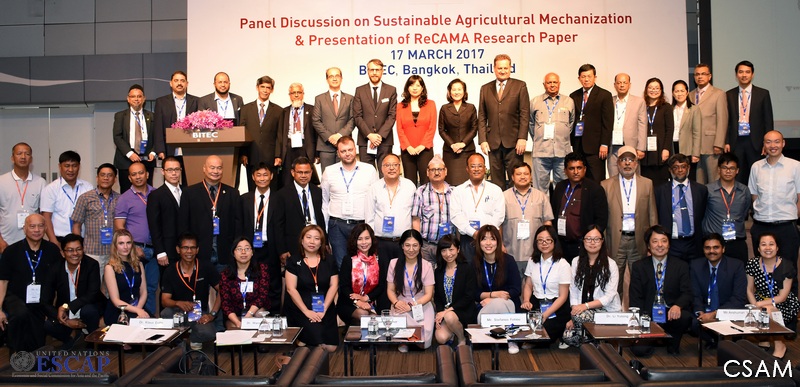Regional Meeting Calls for Joint Efforts and Innovative Partnerships to Promote Sustainable Agricultural Mechanization

On 17th March 2017, in Bangkok, a Panel Discussion on Sustainable Agricultural Mechanization was organized by the Centre for Sustainable Agricultural Mechanization (CSAM) in collaboration with the German Agricultural Society (DLG) during the AGRITECHNICA ASIA Exhibition. The findings of a Research Paper on Trade and Investment Policies of Agricultural Machinery in Selected Countries developed under CSAM’s initiative titled Regional Council of Agricultural Machinery Associations (ReCAMA) was also presented.
During the Panel Discussion, country representatives shared some common challenges in the Asia-Pacific region in developing sustainable agricultural mechanization including those related to a high proportion of farmers being smallholders, scarcity of agricultural labour in many areas, inadequate agricultural infrastructure such as irrigation facilities, low quality of agricultural machinery, weak enforcement of policies, as well as the high-risk nature of agriculture itself. In the context of the challenges posed by climate change and soil degradation, the need to promote environment friendly machinery and practices was noted.
The Panel Discussion also underscored the need for intensifying efforts to help countries in the region to achieve sustainable agricultural mechanization. It recognized the necessity of having strong support from governments and a favorable environment for regional trade and investment. Adoption of appropriate standards to ensure the quality of machinery produced and traded, enabling provision of financial support to smallholder-friendly practices like Custom Hiring, ensuring availability of spare parts and maintenance services, and conducting awareness improvement activities for farmers were some of the other areas emphasized as important.
Placing the event in the context of the 2030 Agenda for Sustainable Development, Mr. Stefanos Fotiou, Director of the Environment and Development Division of the United Nations Economic and Social Commission for Asia and the Pacific, said, “Agricultural mechanization must move from pure technology to a broader context meeting technological, economic, social, environmental and cultural requirements, and offering innovative and economically viable opportunities for growers, consumers, policymakers and other stakeholders in the entire food system.” Representing CSAM as a regional institution of ESCAP dedicated to promoting sustainable agricultural mechanization, Dr. Li Yutong, Head of CSAM, stated “CSAM has showcased its potential for contributing to food security and sustainable agricultural and rural development through agricultural mechanization, and laid solid ground for the Centre’s future growth and expansion. CSAM is looking forward to cooperating with all interested partners in its endeavors.”
